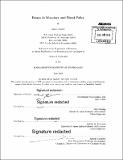| dc.contributor.advisor | Iván Werning and Robert M. Townsend. | en_US |
| dc.contributor.author | Auclert, Adrien | en_US |
| dc.contributor.other | Massachusetts Institute of Technology. Department of Economics. | en_US |
| dc.contributor.other | Rognlie, Matthew | |
| dc.date.accessioned | 2015-09-17T19:05:28Z | |
| dc.date.available | 2015-09-17T19:05:28Z | |
| dc.date.copyright | 2015 | en_US |
| dc.date.issued | 2015 | en_US |
| dc.identifier.uri | http://hdl.handle.net/1721.1/98695 | |
| dc.description | Thesis: Ph. D., Massachusetts Institute of Technology, Department of Economics, 2015. | en_US |
| dc.description | 2nd and 3rd chapter co-authored with Matthew Rognlie. Cataloged from PDF version of thesis. | en_US |
| dc.description | Includes bibliographical references. | en_US |
| dc.description.abstract | This thesis consists of three chapters on monetary and fiscal policy. The first chapter explores the importance of redistribution in explaining why monetary policy has aggregate effects on household consumption. I argue that traditional representative agent models focusing on substitution effects ignore a key component of the monetary policy transmission mechanism, which exists because those who gain from accommodative monetary policy have higher marginal propensities to consume (MPCs) than those who lose. I use a sufficient statistic approach to show that, provided households' elasticities of intertemporal substitution are reasonably small, redistributive effects can be as important as substitution effects in explaining the response of aggregate consumption to real interest rate changes in the U.S. My calibrated general equilibrium model predicts that, if U.S. mortgages all had adjustable rates, the effect of interest-rate changes on consumer spending would more than double and would be asymmetric, with rate increases reducing spending by more than cuts would increase it. The second chapter, joint with Matthew Rognlie, explains why a monetary union between countries (such as the Eurozone today) may lead to a stronger fiscal union. Since exchange rates can no longer adjust to offset shocks, the presence of nominal rigidities implies that fiscal risk-sharing becomes more valuable in a monetary union. As a result, countries in such a union are capable of overcoming their lack of commitment to fiscal transfers. However, inefficient equilibria without fiscal transfers remain possible. We derive implications for the optimal policy of the central bank when the fiscal union is under stress. The third chapter, also joint with Matthew Rognlie, studies the possibility that feedbacks between sovereign bond spreads and governments' desire to default may lead to multiple equilibria in sovereign debt markets. We show that such multiplicity does not exist in the infinite-horizon model of Eaton and Gersovitz (1981), a widely adopted benchmark for quantitative analyses of these markets. Our proof may be important to understand Euro government bond markets, and calls for renewed attention on the theoretical conditions that are needed for sovereign debt models to generate multiple equilibria. | en_US |
| dc.description.statementofresponsibility | by Adrien Auclert. | en_US |
| dc.description.tableofcontents | Chapter 1. Monetary policy and the redistribution channel -- Chapter 2. Monetary union begets fiscal union -- Chapter 3.Unique equilibrium in the Eaton-Gersovitz model of sovereign debt. | en_US |
| dc.format.extent | 156 pages | en_US |
| dc.language.iso | eng | en_US |
| dc.publisher | Massachusetts Institute of Technology | en_US |
| dc.rights | M.I.T. theses are protected by copyright. They may be viewed from this source for any purpose, but reproduction or distribution in any format is prohibited without written permission. See provided URL for inquiries about permission. | en_US |
| dc.rights.uri | http://dspace.mit.edu/handle/1721.1/7582 | en_US |
| dc.subject | Economics. | en_US |
| dc.title | Essays in monetary and fiscal policy | en_US |
| dc.title.alternative | Monetary policy and the redistribution channel | en_US |
| dc.title.alternative | Monetary union begets fiscal union | en_US |
| dc.title.alternative | Unique equilibrium in the Eaton-Gersovitz model of sovereign debt. | en_US |
| dc.type | Thesis | en_US |
| dc.description.degree | Ph. D. | en_US |
| dc.contributor.department | Massachusetts Institute of Technology. Department of Economics | |
| dc.identifier.oclc | 920688308 | en_US |
